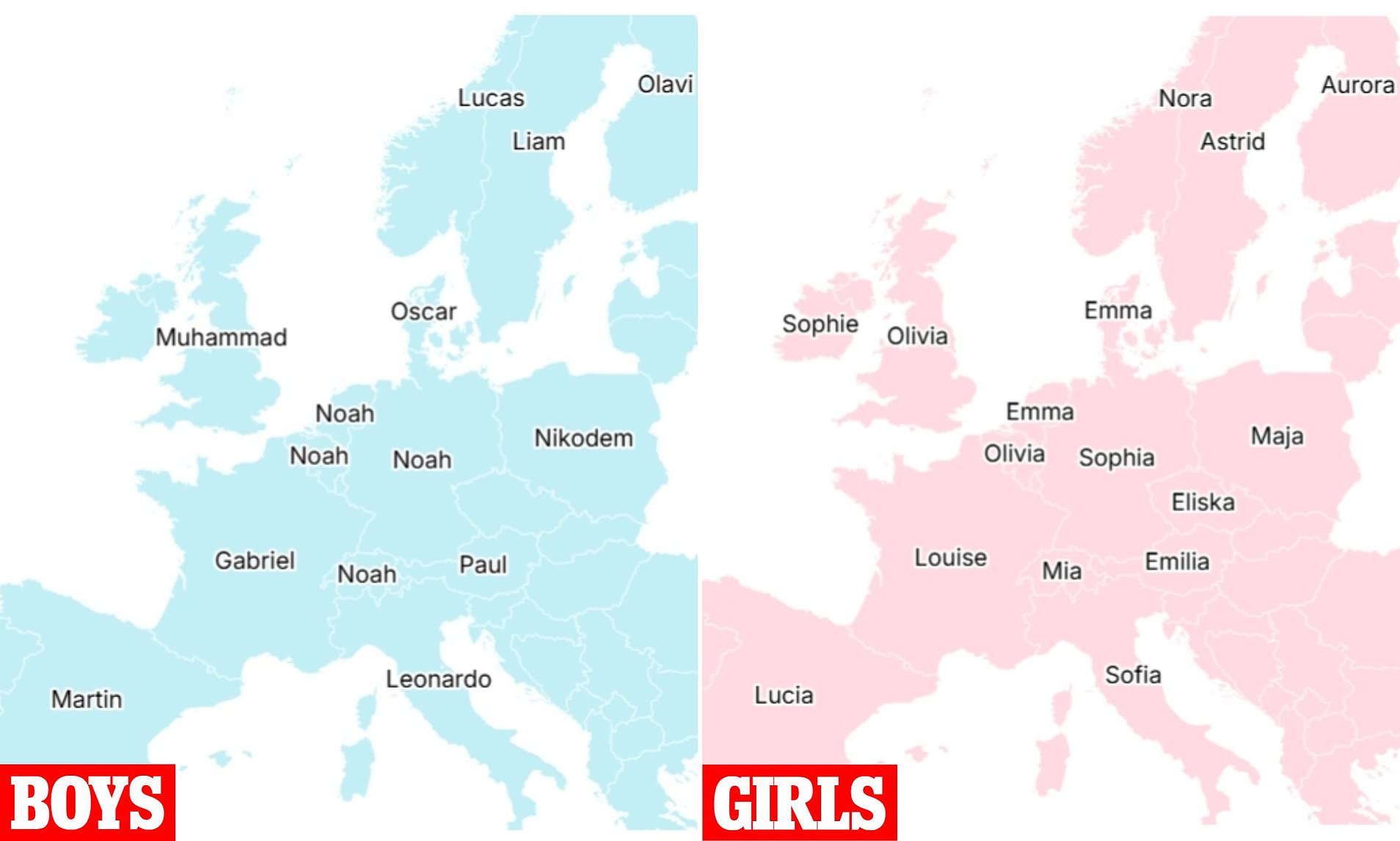Map shows Europe's top baby names

The Most Popular Baby Names Across Europe
The latest data on the most popular baby names across Europe has been revealed, showcasing a mix of traditional and modern influences. From biblical names to international trends, parents across the continent are choosing names that reflect their cultural backgrounds, personal preferences, and even global media exposure.
In Germany, Noah is the top name for boys, while in France, Louise takes the lead for girls. These names were identified through an interactive map that highlights the ten most common names given to children in each country. For girls, Emma and Olivia tied for first place, appearing as the most popular choices in two countries each. Meanwhile, Noah remains a favorite among boys, with four out of 16 countries in the analysis selecting it as the top name.
Clare Green, a naming expert from the website Nameberry, explains that while Noah may seem like a "vintage" name, it still feels fresh to many parents. She notes that biblical names have a universal appeal and can make a comeback due to pop culture references, such as the movie The Notebook. Green also suggests that parents across Europe may be drawn to Noah because it feels like the right time for its return.
Hollywood, music, and royalty continue to influence baby name choices. For example, the name Emma saw a surge in popularity around 20 years ago in several European countries, likely inspired by Jennifer Aniston’s character in Friends. However, not all names cross borders easily. Some complex-sounding Scandinavian names, like those from Sweden or Norway, remain popular within their own regions due to pronunciation challenges.
Green believes that with increased global connectivity, more names could become widely accepted in the future. As people travel more and form multicultural relationships, they may choose names that reflect both their backgrounds. However, she acknowledges that some parents will always prefer unique or traditional names that stand out.
Regional Trends and Cultural Influences
Different European countries show distinct naming trends. In Italy and Spain, classic names with religious or historical significance remain strong, reflecting a deep respect for family traditions. In contrast, countries like Sweden, the UK, and the Netherlands are leaning toward more creative or international names. This shift is attributed to greater exposure to global media and a growing emphasis on individuality.
The UK, for instance, has one of the most liberal naming systems in the world, similar to the United States. Parents have almost complete freedom when choosing a name, with only extreme cases—such as offensive or harmful names—being restricted. In 2016, a mother in Wales was denied the name Cyanide for her daughter, as it was considered too offensive.
Other countries have stricter rules. Denmark requires parents to choose from a list of 7,000 pre-approved names or seek government approval. Germany also limits name choices, banning surnames like Merkel or Müller from being used as first names. France prohibits embarrassing or inappropriate names, such as Nutella, while Switzerland prevents names that infringe on trademarks, like Mercedes or Chanel.
The Science Behind Baby Names
Beyond cultural and legal factors, science is also playing a role in how parents choose names. Research suggests that names that are easy to pronounce are often viewed more positively. A study published in the Journal of Experimental Social Psychology found that people with simple names are perceived as more likable and trustworthy.
Another study linked names with gender associations to behavior patterns. Boys with traditionally female-sounding names were more likely to face disciplinary issues in school, possibly due to social pressure. However, Clare Green emphasizes that a child's name reflects the values and beliefs of their parents more than any long-term impact on their life.
Methodology and Data Sources
The data analyzed for this report came from official statistical bodies across Europe. It focused on official first names, excluding nicknames or alternative names. Here are the sources for each country:
- France: Provided by the French National Institute of Statistics and Economic Studies (INSEE) for 2023.
- Czech Republic: Provided by the Czech Statistical Office for 2024.
- Sweden: Provided by Statistics Sweden for 2022.
- Belgium: Provided by the Belgian Statistical Office (Statbel) for 2024.
- Austria: Provided by Statistics Austria for 2023.
- Switzerland: Provided by the Federal Statistical Office for 2023.
- Germany: Provided by the Society for German Language for 2024.
- Spain: Provided by the National Statistics for 2022.
- Ireland: Provided by the Central Statistics Office for 2024.
- Poland: Provided by Statistics Poland for 2024.
- Denmark: Provided by Statistics Denmark for 2024.
- Norway: Provided by the Statistics Norway for 2024.
- Finland: Provided by the Digital and Population Data Services Agency for 2024.
- Italy: Provided by the Italian National Institute of Statistics (ISTAT) for 2023.
- Netherlands: Provided by the Social Insurance Bank (SVB) for 2024.
These insights highlight how baby names are shaped by a combination of tradition, creativity, and global influences, making them a fascinating reflection of cultural identity.

Comments
Post a Comment